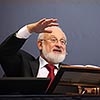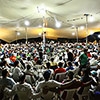“Happiness: Lessons from A New Science”
 Opinion (Richard Layard, Professor Emeritus Lord Layard, British labour economist, currently working as programme director of the Centre for Economic Performance at the London School of Economics): “’There is a paradox at the heart of our lives. Most people want more income and strive for it. Yet as Western societies have got richer, their people have become no happier.’ Layard is one of many to propose this paradox. It is often referred to as the ‘Easterlin Paradox,’ named after economist Richard Easterlin, who demonstrated exactly this for citizens in developed countries with sufficient welfare to provide for at least the basic needs of each person. …
Opinion (Richard Layard, Professor Emeritus Lord Layard, British labour economist, currently working as programme director of the Centre for Economic Performance at the London School of Economics): “’There is a paradox at the heart of our lives. Most people want more income and strive for it. Yet as Western societies have got richer, their people have become no happier.’ Layard is one of many to propose this paradox. It is often referred to as the ‘Easterlin Paradox,’ named after economist Richard Easterlin, who demonstrated exactly this for citizens in developed countries with sufficient welfare to provide for at least the basic needs of each person. …
“Not only do we compare our income to that of others, we also set a norm for our income based on what we ourselves have grown accustomed to. The more money we make, the more money we think we need. This phenomenon is called ‘habituation’ or ‘adaptation.’ It can be compared to building up a tolerance for alcohol or drugs. Layard calls this ‘The Hedonic Treadmill’: To maintain the same level of happiness, we need to keep running.
“Richard Layard (2005) argued that seven factors are central to happiness. Furthermore, he used research such as the US General Social Survey to establish (for the US at least) five in some sort of order of importance. Two further factors were seen as central, but could not be ranked due to lack of survey evidence.
“Family relationships. In just about every study, family relationships and our close private life are ‘more important than any other single factor affecting our happiness.’
“Financial situation. As we have already seen our individual financial position is of significance – especially when we are on the margins of poverty – but beyond that it is a poor second to the quality of close family relationships as a significant source of longish term happiness.
“Work. There is considerable evidence that we need to feel we are contributing to the wider society. Layard comments, ‘[W]ork provides not only income but also an extra meaning to life’. He continues, ‘That is why unemployment is such a disaster: it reduces income but it also reduces happiness directly by destroying the self-respect and social relationships created by work.’
“Community and friends. As we have already seen writers like Lane have placed a strong emphasis upon companionship. However, it is also clear that the quality of the communities in which we participate has a strong influence upon how we feel. If we do not live and operate in communities and groups where there is a sense of trust and belonging then there is a raft of evidence that shows the impact upon our ability to be happy. …
“Health. In studies people frequently cite health as an important contributor to happiness. …
“Personal freedom. Happiness also depends upon the quality of the political, economic, legal and social systems in which we operate. There is some evidence that people living in stable and peaceful societies in which they have a voice and an ability to follow their interests (where it does not harm others), and in which institutions are accountable will be happier.
“Personal values. People’s happiness depends on their ‘inner selves‘ and philosophies of life. ‘People are happier if they are able to appreciate what they have, whatever it is; if they do not always compare themselves with others; and if they school their own moods.’” (Source: infed)
“Modern society desperately needs a concept of the common good around which to unite the efforts of its members. Here is the right concept. We want to increase the general happiness and we commit ourselves to that end.”
My Comment: Of course, this is a wonderful goal. But first, it is necessary to realize that happiness is possible only beyond our egoism, not in it and not in suppressing it. That is why we need a method for getting out of egoism, the method of Kabbalah, or rather, the Light, the force of bestowal and love, which is manifested when this method is implemented.
[131231]
Related Material:
The Secret Of Happiness
Can Money Buy Happiness?
What Is Happiness?













